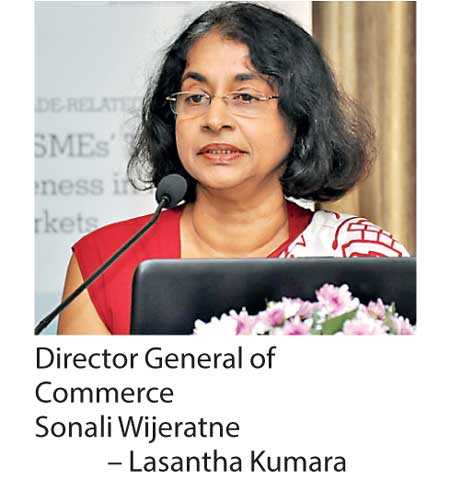Thursday Feb 26, 2026
Thursday Feb 26, 2026
Wednesday, 20 June 2018 00:10 - - {{hitsCtrl.values.hits}}

By Uditha Jayasinghe
In the backdrop of declining global foreign investment flows Government policy should focus on matching local industrial policy with free trade deals as structural changes in the economy cannot be accomplished through liberalisation alone, a top official said yesterday.
Director General of Commerce Sonali Wijeratne, addressing a workshop on investment negotiations organised by the International Trade Centre, pointed out that governments would have to include investment in their trade deals, like Sri Lanka had done in its Free Trade Agreement (FTA) with Singapore, to gain the best benefits from the deal.
“The current global trend in bilateral free trade agreements and regional trade agreements is that they are increasingly covering investment in their treaties. As we all know, investment, in particular Foreign Direct Investment (FDI), plays a central role in achieving economic growth. In a conducive environment investment helps to boost economic productivity, a country’s growth potential, employment creation and eventually to achieve higher standards of living,” she said.
However, developing countries in particularly have to contend with the rising challenge in the negative trend of global investment. In 2017 global inflows of FDI declined by 23%. A very modest recovery is predicted for 2018. According to the World Investment Report 2018, FDI growth remained near zero in developing countries with a steep fall in cross border investment in developing and transitional economies, Wijeratne added.
A formidable factor is the structural impact of the digital economy on foreign direct investment, posing challenges to developing and least developed countries. Developing countries are beset by structural complaints such as a lack of adequate infrastructure, scarce access to finance, strategic issues, automated manufacturing that vitiates against cheap domestic labour, and off shoring locations that hamper their ability to attract investment.
Wijeratne pointed out the importance of manufacturing for raising living conditions through the creation of employment in the formal sector. She drew a connection between new industrial policies and investment policies. A chapter on investment liberalisation in a FTA for example cannot stand alone from a holistic and integrated industrial and agricultural policy which according to the World Investment Report 2018 has to contain detailed pragmatic recommendations and a timeline for action with clearly delineated division of responsibility among public and private sector stakeholders, she went on to say.
“It is in this context that the current global debate on investment policy has realised that structural transformation does not automatically happen due to deregulation and liberalisation initiatives alone. It is important to realise that governments around the world have redesigned and reinvigorated their industrial policies through multiple instruments ranging from trade to education. Foreign investment is the catalyst that builds and upgrades these industries mainly due to the update of existing investment policy instruments that include investment incentives, special economic zones, investment facilitation and foreign investment screening mechanisms.”
Wijeratne was candid that there could be downsides to FDI, stressing that Sri Lanka was among many countries that had experienced disputes between investors and the state.
“As we can observe, countries experience increasing investor-State disputes mainly based on the countries bilateral investment treaties. There are ongoing discussions on the need of reviewing and reforming international investment laws. Given the surge in recent Investor-to-State dispute cases, several countries, including both developed and developing economies, have been reviewing their approach to investment treaties. Governments are looking at ways of keeping their policy space to fulfill obligations to the general public by reducing their legal liability under bilateral investment treaties. Sri Lanka is also one of the victims of such Investor-State disputes.”